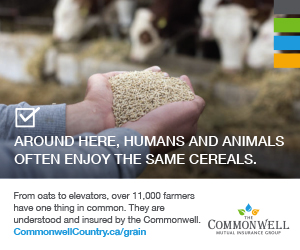Cultivating community relations
FARMER EXEMPLIFIES ROLE OF LOCAL AMBASSADOR
LOCATION IS JUST as important in agriculture as it is in real estate. But for Max Kaiser, the impact of his location reaches beyond soil type and topography — it simply means farming where most farmers do not.
PHOTO: AERIAL VIEW OF KAISER LAKE FARMS AND THE SURROUNDING AREA.

Hay Bay, in the picturesque Quinte region of Ontario, is where Kaiser and his family business, Kaiser Lake Farms, call home. The Kaisers produce eggs and grow 950 acres of corn, soybeans, and wheat. They represent the only active farm in a community of neighbours who are not involved in agriculture.
“Our farm covers a 1,300 acre block at lake-level on the east end of Lake Ontario,” explains Kaiser. “This means that we have 200 non-farming neighbours who live lake-side and our operation is very visible to them.”
UNIQUE POSITION
Kaiser’s family has been farming Kaiser Lake Farms since 1969 and, at that time, the neighbourhood was smaller and relations were natural. “Historically, this area was made up of summer cottages with only a handful of year-round residents. My parents knew the neighbours and extended the courtesy of telling them when things were happening on the farm,” says Kaiser.
Now, the number of neighbours has grown substantially and there are fewer personal friendships. But despite this challenge, the Kaiser family continues to work to keep the community informed.
“I have always encouraged farmers to be good ambassadors for the industry and that is the principle we try to follow directly with our neighbours,” he says.
Kaiser explains the choices he makes on the farm are still based on agronomics, economics, and the environment, but he makes these decisions with the goal of communicating why agricultural practices are the way they are. “We want our neighbours to know why we do things and if they understand that, we hope they will be more tolerant of the farm.”
IMPROVING COMMUNICATIONS
“Manure practices are probably the biggest annoyance because of the noise, lights, and smell,” says Kaiser. To encourage communication on this topic, he writes a letter explaining when and where manure will be spread and distributes over 200 copies to local mailboxes on the May long weekend.
Kaiser notes that he receives many positive responses to these letters and when there is two-way communication with the neighbours, he can usually manage to work around interrupting their parties or events.
He and his family also dedicate a small portion of the farm to a pick-your-own strawberry patch for the community to enjoy. “We are at the patch at all times so that we can connect with the families and take advantage of the opportunity to have a conversation,” says Kaiser.
Local residents also have the opportunity to visit the farm each summer when they host a pork and corn roast for the Rotary Club of Napanee. “It is a bit of a liability to have that many people on the farm but Rotary organizes the entire event and it is another opportunity for people to talk to us.”
NEIGHBOURS MATTER
While Kaiser’s location means that he has more scrutiny from non-farming neighbours than most other farmers, his situation is becoming more common – less than two per cent of the population farms.
According to Farm & Food Care’s 2012 study on Canadian attitudes towards food and farming, 93 per cent of the population knew little or nothing about agriculture. But work like Kaiser’s is not only important but welcome too, as the study found that 59 per cent of Canadians want to know more about food and farming and specifically about farm techniques.
Kaiser, who has also been known to give classroom presentations about agriculture as ‘New McDonald’, encourages other growers to be in the ambassador mindset.
“It’s all about communication,” he says. “When I am spraying a field, people will stop and ask to take a picture with the equipment. There are a lot of misconceptions about what is in that tank, so I will stop and answer their questions.”
Kaiser also says it is important to keep your farm tidy and show it proudly. “We cut all of the grass around our lanes and have open road access, meaning that people can clearly see our property,” he says. “Many of the neighbours use our lane for walking and our hill for tobogganing and we also use that as an opportunity for education about what we do as farmers.” •








